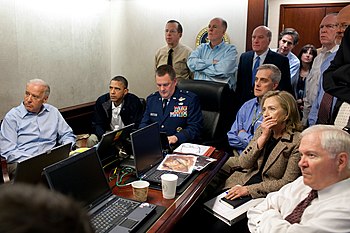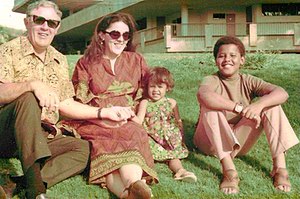 Image via Wikipedia
Image via WikipediaStates exist. There is a state in almost every country. There are one or two countries that feel stateless. Even in those countries there are semblances of the entity, the state. A state is a political entity. States interact with each other.
The US state has a close relationship with the Saudi state. A lot of people in the Arab street take that to mean the US is a hypocritical power that talks about democracy but shakes hands with an autocratic state like
Saudi Arabia.
I preach governance literacy to the netroots/grassroots that put
Barack Obama into power in 2008. They were more excited before Obama got into power than they have been since he has been in power. It is almost as if they miss being in opposition. That comes from a lack of governance literacy.
If America had a declared policy that should Saudi Arabia become a democracy like Turkey, it would impose
economic sanctions upon that new democracy, then I would agree that America is an evil power that not so secretly is for autocracy. But America has no such policy.
America was not opposed to the people of Iran coming out into the streets. America is not opposed to the people of Saudi Arabia coming out into the streets. America is not opposed to the people of Egypt and Syria coming out into the streets.
America can not be, is not opposed to democracy movements. America as a country was born with a mission. That mission is a total spread of democracy. But the American state has to deal with states as they exist, not as it wished they were. I am 100% sure President Obama and Secretary Clinton fantasize about Egypt being a democracy, and Saudi Arabia and Syria being democracies, but it is their job to deal with Egypt and Saudi Arabia and Syria as they exist today. They get paid by the American people to deal with those states as they exist today. A soldier gets paid to fight. A president gets paid to run a country.
The vast, mysterious apathy of the Saudi masses is the reason there is no democracy in Saudi Arabia. The US is not to be blamed.
As for the global arms trade, I have my thoughts and feelings about that, and
drug trafficking and human trafficking. I have my thoughts and feelings about a world free of
nuclear weapons. President Obama also wants a world free of nuclear weapons. He said that in a speech early as president. But then there is the goal and there is the road map to that goal. I do think his road map takes too long. But I am glad for the shared goal.
One big reason I feel strongly about democracy in Iran is because I hope Iran will set an example, and people will flood the streets also in Cairo, in Riyadh down the line. I am hoping for a domino effect.
What excites me is that I think the global netroots/grassroots is sufficient unto itself to bring about fundamental political change in these countries.
But I am pragmatic about getting help from any and all actors. There can be no room for violence. Other than that I am for raising a lot of money. I want money from private individuals, from
NGOs, from states, if possible. Heck, I will take money from the
CIA, as necessary. As long as the basic goals and methods are not compromised, I do envision a resource rich movement for Iran.
Actually that has been one of my consternations. The US executed a trillion dollar military plan to bring democracy to Iraq. Why will it not think of a billion dollar grassroots/netroots non violent plan to bring democracy to Iran? I'd help shape that. I have done this before for Nepal. I can do this again for Iran.
Eisenhower talked of a "military industrial complex" as did Gorbachev. There are powerful people who stand to make a lot of money when weapons are sold to the Saudi state. That geopolitical detail does not take away from the democracy movement in Iran. The grassroots work for democracy must go on.
In The News
New Turkey Huffington Post (blog)
While European societies are mired in recession, paralyzed by self-doubt and divided by rising social conflicts, Turkey is hurtling toward the future. ..... This year Turkey's economy is projected to grow by more than 11 percent, second only to China. ..... Foreign Minister Alexander Stubb of Finland saluted Turkey as "a truly global player" and "one of the top five countries in the world today."
Jewish Minority Influential In Iran NPR
the country's estimated 25,000 Jews. .... They feel very Iranian. They've been there longer than anyone else, really, going back 2,800 years. .... there are minorities in Iran and the fact that it is not a monolithic society. ..... Iran is 97 percent Shia-Muslim .... there is a Jewish member of parliament. There's a Zoroastrian member of parliament. There's a Christian member - two Christian members of parliament..... Jews are free, yes. ... They're allowed to drink, for example, in a country where alcohol is banned. ....... They can have a member of parliament, but they can't become a minister, for example. You have to be a Muslim. That's part of the constitution. ....... when it comes to expressing any kind of sympathy for Israel or the idea of a Jewish homeland, no, they are not free to do that. ...... It is a perfectly democratic system, so long as everyone does what they're told. .... if you're a Muslim who decides to convert - well, that's punishable by death. ..... the whole idea behind the challenge to Ahmadinejad and the challenge to the system subsequent to the election was that the experiment has gone wrong.
$60 billion arms deal between United States and Saudi Arabia Party for Socialism and Liberation
. Under secret negotiation since 2007 .... the largest arms deal in U.S, history. .... up to 84 Boeing F-15 fighters and upgrade 70 others .... 70 Apaches, 72 Black Hawks, and 36 Little Birds. ..... the U.S. military-industrial complex has increased its share to more than two-thirds of all foreign armaments deals ... No elections have ever been held in Saudi Arabia, and the country has a horrendous human rights record.
Did Iran really do so well out of the Iraq war? The Guardian
The Americans ... spent over a trillion dollars, lost more than 4,000 people, tarnished their reputation in the region and failed to control Iraq's oil wealth...... Iran can arm and fund militias till kingdom come, but at the end of the day, in Iraq, it is ballot papers, not bullets, that decide who stays in power and who gets the boot. .... When Grand Ayatollah Ali al-Sistani, Iraq's highest-ranking Shia scholar, fell ill during the summer of 2004, he tactically avoided travelling to Iran for treatment. ...... The Iraqi army continues to go from strength to strength, the Iraqi intelligence is ever more capable of gathering information and Iraq will soon catch up with the region in oil exports
Only Democracy For Iran calls the International Criminal Court to action. Iran Press Watch
What the Hiker Release Says About Iran's Internal Power Struggle TIME
a level of chaos and political infighting inside the regime ..... what was most notable about Shourd's release was the rebuke it involved for President Mahmoud Ahmadinejad at the hands of his own judiciary..... Iran's judiciary — controlled by rival conservatives who are loyal to Supreme Leader Ayatullah Ali Khamenei but antagonistic to Ahmadinejad ...... insisted on the bail payment of $500,000 .... . The infighting in Tehran is really vicious right now, and more publicly visible than it's ever been..... a degree of chaos in the regime rather than easily defined factional battles ...... There have even been signs of open conflict between the President and the Supreme Leader ...... a system that puts final executive authority in the hands of an unelected clergy ..... "Ahmadinejad is asserting the autonomous powers of the presidency in a way we haven't seen before, even pushing back against the Supreme Leader. And some see that as heresy."
India develops a new axis with Iran and Russia Daily News & Analysis
Why Ayad Allawi is Iraq's greatest political survivor Telegraph.co.uk
a land where a politician's status can often be measured by often someone has tried to kill them ..... Despite general improvements since the US-led troop surge in 2007, he feels the country is still teetering on the edge of the abyss. ..... London, where he spent decades as an opposition leader after defecting from Saddam Hussein's Ba'ath Party during the 1970s. ..... still maintains strong links with the British govermen and spent part of last week meeting the new Foreign Secretary William Hague ...... Sectarianism, he claims, is still rife in Iraq, within both the security forces and the political establishment. ....... His party has a strong following among Iraq's Sunni minority, although he himself is from a wealthy Shia family ..... His grandfather helped to negotiate Iraq's independence from Britain ...... the fears voiced recently by the Iraqi military chief of staff, General Babakir Zebari, that its armed forces will not be fully ready until 2020 .... the West should begin talking to the Taliban and Mullah Omar in Afghanistan, just as Britain and America ended up talking to Shia and Sunni insurgents in Iraq
Freedom, democracy and human rights in Syria Independent
A country cannot be built on past grudges. We have to forgive – I don't know about forget – and we have to live together, all Syrians who believe in democracy and human rights, to have a new era. The Berlin Wall fell, the Soviet Union collapsed. Syria will change." ..... he wants Syria to break its relations with Iran ..... Damascus is the West's gate to Iran, Bashar is the middle-man between Washington and Tehran. ..... We are campaigning internationally for a new Syria.






































![Reblog this post [with Zemanta]](http://img.zemanta.com/reblog_e.png?x-id=e779807a-13fe-4fb6-bb11-0beb21d352aa)



![Reblog this post [with Zemanta]](http://img.zemanta.com/reblog_e.png?x-id=02fb0959-31e7-43f9-9e41-c09272e51ab2)